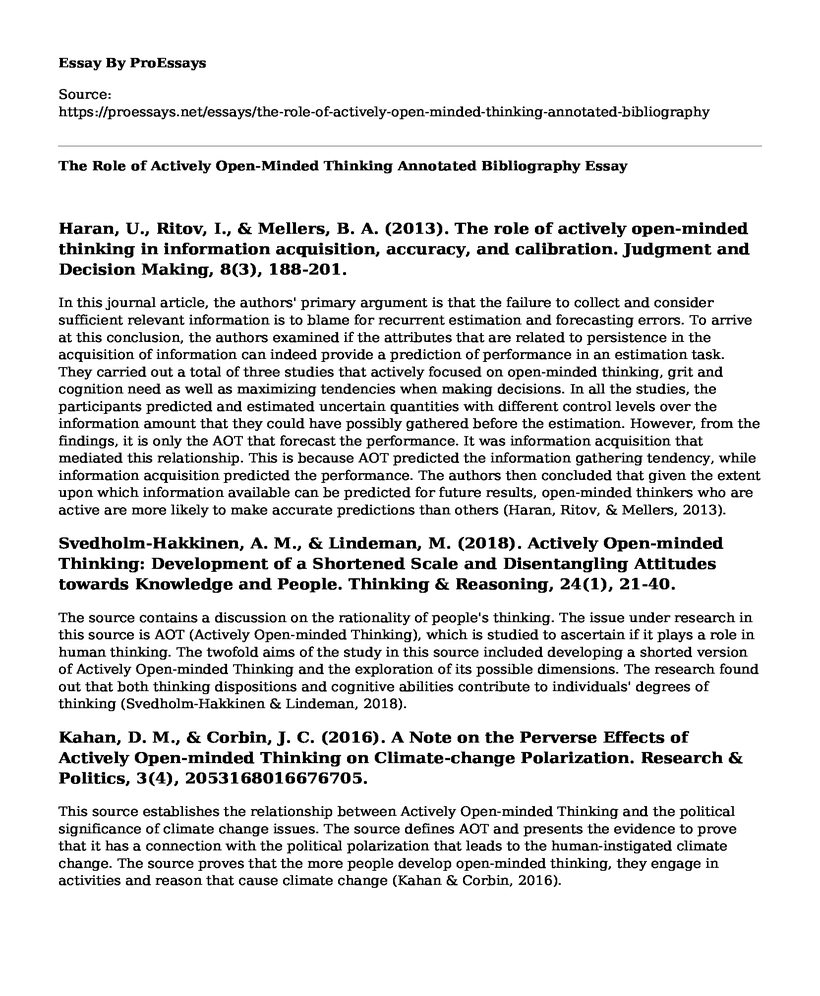Haran, U., Ritov, I., & Mellers, B. A. (2013). The role of actively open-minded thinking in information acquisition, accuracy, and calibration. Judgment and Decision Making, 8(3), 188-201.
In this journal article, the authors' primary argument is that the failure to collect and consider sufficient relevant information is to blame for recurrent estimation and forecasting errors. To arrive at this conclusion, the authors examined if the attributes that are related to persistence in the acquisition of information can indeed provide a prediction of performance in an estimation task. They carried out a total of three studies that actively focused on open-minded thinking, grit and cognition need as well as maximizing tendencies when making decisions. In all the studies, the participants predicted and estimated uncertain quantities with different control levels over the information amount that they could have possibly gathered before the estimation. However, from the findings, it is only the AOT that forecast the performance. It was information acquisition that mediated this relationship. This is because AOT predicted the information gathering tendency, while information acquisition predicted the performance. The authors then concluded that given the extent upon which information available can be predicted for future results, open-minded thinkers who are active are more likely to make accurate predictions than others (Haran, Ritov, & Mellers, 2013).
Svedholm-Hakkinen, A. M., & Lindeman, M. (2018). Actively Open-minded Thinking: Development of a Shortened Scale and Disentangling Attitudes towards Knowledge and People. Thinking & Reasoning, 24(1), 21-40.
The source contains a discussion on the rationality of people's thinking. The issue under research in this source is AOT (Actively Open-minded Thinking), which is studied to ascertain if it plays a role in human thinking. The twofold aims of the study in this source included developing a shorted version of Actively Open-minded Thinking and the exploration of its possible dimensions. The research found out that both thinking dispositions and cognitive abilities contribute to individuals' degrees of thinking (Svedholm-Hakkinen & Lindeman, 2018).
Kahan, D. M., & Corbin, J. C. (2016). A Note on the Perverse Effects of Actively Open-minded Thinking on Climate-change Polarization. Research & Politics, 3(4), 2053168016676705.
This source establishes the relationship between Actively Open-minded Thinking and the political significance of climate change issues. The source defines AOT and presents the evidence to prove that it has a connection with the political polarization that leads to the human-instigated climate change. The source proves that the more people develop open-minded thinking, they engage in activities and reason that cause climate change (Kahan & Corbin, 2016).
Baron, J. (2017). Comment on Kahan and Corbin: Can polarization increase with actively open-minded thinking? Research & Politics, 4(1), 2053168016688122.
This source is a response to Khan and Corbin, who posit that cognitive capabilities establish Actively Open-minded Thinking, which are used in defending people's favored positions. According to Khan and Corbin, this is what leads to political polarization on issues of global warming. This response article by Jonathan Boron states that the conclusion by the two researchers contradicts the definition of Actively Open-minded Thinking. Jonathan suggests that AOT, in correlation with other traits is what leads to political polarization on issues of global warming (Baron, 2017).
Hemmati, M., & Rohr, U. (2009). Engendering the Climate-change Negotiations: Experiences, Challenges, and Steps Forward. Gender & Development, 17(1), 19-32.
This article by Ulrike Rohr and Minu Hemmati addresses the issue of gender-related climate change issues. The article discusses the experiences and insights from processes of the international climate-change policy, giving the history of the participation of women in issues of climate change, and the processes achieved with a view to inspiring gender experts and women to increase their participation in issues of global climate change. The article attempts to answer the question of whether gender makes a difference as far as climate-change policy formulation and implementation are concerned (Hemmati & Rohr, 2009).
Cite this page
The Role of Actively Open-Minded Thinking Annotated Bibliography. (2022, May 17). Retrieved from https://proessays.net/essays/the-role-of-actively-open-minded-thinking-annotated-bibliography
If you are the original author of this essay and no longer wish to have it published on the ProEssays website, please click below to request its removal:
- Experiential Learning Theory Paper Example
- Unequal Childhoods Interview Paper Example
- US Terrorism and Homeland Security: I Am Malala
- Essay Sample on Play: A Tool for Development and Expression
- Bilingual vs. Monolingual Children: Examining Working Memory Performance - Essay Sample
- Article Review Sample on Creating an Effective Online Learning Environment
- Student Success Initiatives - Free Essay Example







